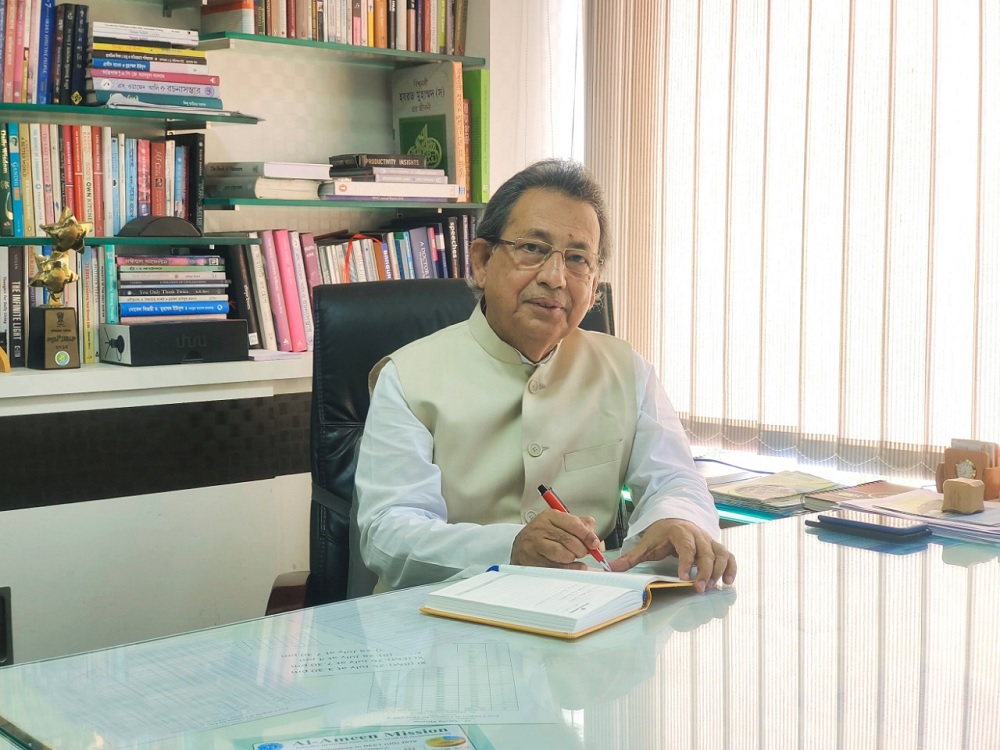
by Editor | Sep 13, 2022 | Muslim World, News
New Delhi: (Maeeshat News Network) Near about 500 medical aspirants will get chance to study MBBS and BDS in the Govt. Medical Colleges from Al-Ameen Mission this year, among which 100 are the girl students. All they have secured more than 550 marks in the National Eligibility cum Entrance Test (NEET) exam. There are also two students who are hafiz e Quraan and now going to study MBBS.
Last year this number was 400.
“It is a great success and all time record in the history of Al-Ameen Mission,” said Al-Ameen Mission founder and general secretary M Nurul Islam.
He reiterated that Al-Ameen Mission was established in 1987 and now it has 72 centres. The educational institute was formed to give quality education to underprivileged students who are unable to continue studies due to the financial crisis. Most of the students who are trained at Al-Ameen Mission come from remote villages.
Islam pointed out that Al-Ameen Mission has around 72 campuses (from 5th to 12th standard). This year’s NEET saw some brilliant performances from Al-Ameen Mission students (both non-residential and residential).
Among the non-resident students of Al- Ameen Mission, Kushnakur Bhowmick secured the highest marks. He scored 686 out of 720 marks in NEET. His all India rank (AIR) is 427.
However, among the residential students of the institute, Irfan Habib, son of a modest farmer, Abdul Subhan of Cooch Behar district in West Bengal, scored the highest marks. He scored 685 in NEET this year, his rank is 594 in All India. It should be mentioned that 225 students of the institute have scored more than 600 marks in NEET.
Akhtara Parvin, a resident of Birbhum district in West Bengal, has achieved excellent results among the girl students of Al- Ameen Mission. She has been studying in Class VII since 2015 at the Khalatpur campus of Al- Ameen Mission. “ I got 96% marks in the class X board exam and 98% marks in class XII board exam. I got only 480 marks in NEET last year because I couldn’t prepare at home due to lockdown, but this year I got 653 marks with the help of Al- Ameen Mission,” said Akhtara, who was ranked 3915 in All India.
List of some students who qualified NEET
Name: KUSHANKUR BHOWMICK: Marks: 686 AIR: 427
Name: IRFAN HABIB: Marks: 685 AIR: 594
Name: MD RABIUL ISLAM: Marks: 680 AIR: 905
Name: SHAIKH WASIM HASAN: Marks: 675 AIR: 1088
Name: EMDADUL HAQUE: Marks 670 AIR: 1541
Name: NUR JAMAN SEKH: Marks 670 AIR: 1562
Name: SHAKIL AHMAD: Marks 670 AIR: 1742
Name: SYED S RAHAMAN: Marks 665 AIR: 2068
Name: SK PARVEZ SAYEED: Marks 665 AIR: 2103
Name: MD ABU HASEM: Marks 665 AIR: 2113
Name: ARIF SK: Marks 661 AIR: 2545
Name: WALIUR RAHAMAN: Marks 661 AIR: 2589
Name: MD HASHIBAR RAHAMAN: Marks 660 AIR: 2830
Name: ASHIQUE MOHAMMAD: Marks 660 AIR: 2882
Name: NAHID AHMED: Marks 660 AIR: 2883
Name: IRFAN HABIB SHAIKH: Marks 658 AIR: 3022
Name: QAZI MD MUDDASSIR: Marks: 657 AIR: 3081
Name: KAZI MONIRUL ISLAM: Marks 657 AIR: 3162
Name: RAIHANUDDIN MISTRI: Marks 655 AIR: 3489
Name: MD HASANUJJAMAN: Marks 655 AIR: 3593
Name: MD FIROJ JAMAN: Marks 654 AIR: 3775
Name: AKHTARA PARVIN: Marks 653 AIR: 3915
Name: MD SAMAYAN SK: Marks 652 AIR: 3953
Name: MINHAJ AHMED: Marks: 650 AIR: 4350
Name: R SANDIPAN: Marks 650 AIR: 4354
Name: SYED MD TAMIM: Marks 650 AIR: 4564
Name: MUMTARIN KHATUN: Marks 650 AIR: 4601



Selection procedure for Class V to IX
- The examination is held as per syllabus of the related class. 10 marks are given outside of the syllabus.
- The students are called for an objective test and guardian interview if they get qualifying marks.
- The marks of the objective test are added to the marks of the admission test and thereafter students are selected on the basis of guardian interview.
- Poor, orphan and needy students get free-ship / half free ship or subsidy in their fees as per consideration.
For admission details, students should visit the official website – alameenmission.org.
History of Al-Ameen Mission
M Nurul Islam, set up the Khalatpur Junior High Madrasa in 1976 when he was still studying his 10th Standard. In May 1984, he started the Institute of Islamic Culture, setting up a hostel for the institute in 1986 in the Madrasa building itself with the collection of one fistful of rice from every home in his village, Khalatpur. In January 1987, it was renamed as Al-Ameen Mission.
As well as being an educational institute, Al-Ameen Mission does charitable works for the Muslim community. It has also scholarship programs to help needy students of all communities.
Al-Ameen Mission is a residential institute located near Khalatpur, Udaynarayanpur, Howrah, West Bengal, India. Established in 1986, it has now spread across 15 districts of the state with 18000 students in 72 branches.
Al-Ameen Mission follows the curriculum of WBBSE, WBCHSE, CBSE Board. Al Ameen Mission received the prestigious “Banga Bhusan Award” in 2015 which is awarded by the Govt. of West Bengal.
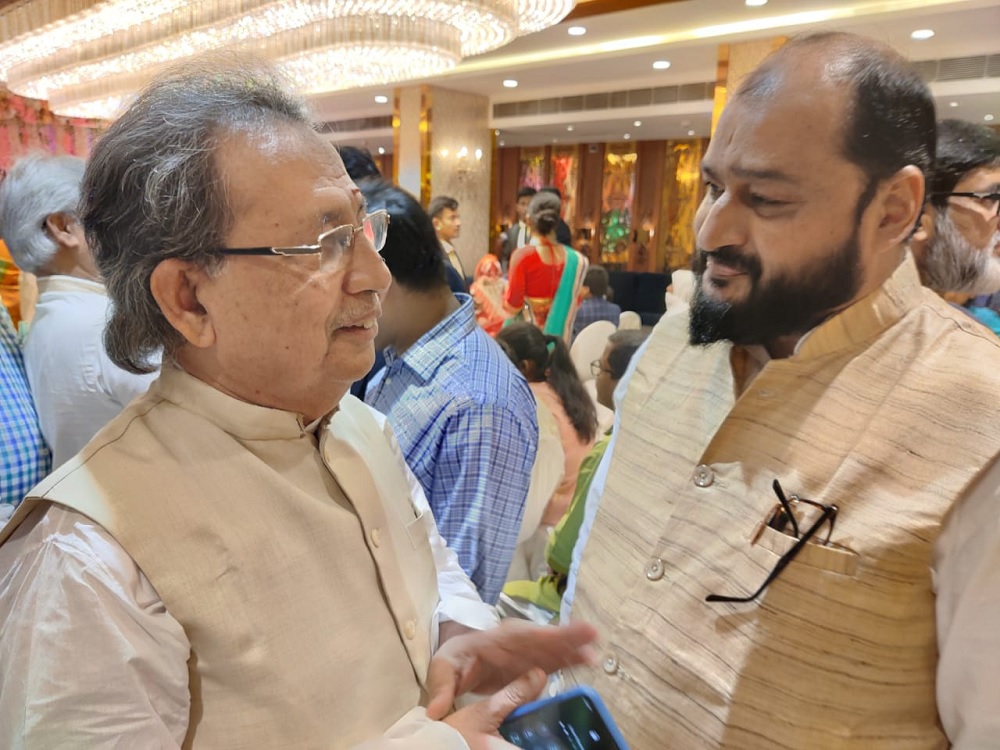
by Editor | Jan 11, 2022 | Interviews
The otherwise poor and rudderless Muslim community in West Bengal is awakened now and raring to succeed thanks to the Howrah-based Al Ameen Mission, anchoring an educational renaissance in the state. Danish Reyaz speaks to its Founder-General Secretary M.Nurul Islam about Mission’s journey, vision, and impact on Bengali Muslims.
Al-Ameen Mission has strived to educate the community from its very beginning, how far has it been successful in this mission?
Al-Ameen Mission began its journey in 1986. When it started its journey with only eleven students in a remote village, the overall education scenario of the Muslim community in West Bengal was quite dismal. There were various reasons- historical, social and economic as well. We realised that we should strive to educate the community, as you rightly mentioned, for the betterment of it. Frankly speaking, with the grace of Allah, we have been successful in this endeavour. There were many ups and downs in our journey. But we had never stopped. So far, we could say we are successful in our mission. We have scores of doctors, engineers, professors, teachers, civil servants, entrepreneurs. Our boys and girls are working throughout the country and have also established themselves abroad. I can say in a nutshell that we have infused new blood in an otherwise moribund society, which had seen for more than three decades post independence.
West Bengal is considered to be a backward area from the time of independence, but the backwardness of Muslims has increased further, what are the reasons for this?
The reasons are not difficult to find out, you know. We have to bear in mind that India was partitioned during independence of the country back in 1947. Muslims, not all, of course, went to East Pakistan during that period. The problem was that the intelligentsia went away as the fallout of partition. Those who remained here were confined mainly in the rural areas. Most of them were small farmers. Many went for blue collar jobs. Lack of education made the whole community to remain stagnant. What we did was to plant a seed of education which has eventually turned into a gigantic tree.
Al-Ameen Mission has educated thousands of children, how it has been successful in making an impact?
As I have already mentioned, we have gradually been able to turn the table. When we started our journey 35 years ago, the percentage of Muslim students in Medical as well as in Engineering was only 2% or 3%. But due to our endeavour mainly that percentage has risen to 20 to 30%. It has imbibed confidence. Boys and girls mostly from backward areas and lowest strata of the society are now dreaming to becoming doctors, engineers, civil servants, scientists, teachers, professors and some have even ventured into being entrepreneurs. Obviously, a silent revolution is taking place.
Al-Ameen Mission is establishing a new campus in New Town, how it realized the need for this?
Yes, a project is under construction in the New Town. We have a 2 acre of land there. It will be called Al-Ameen Mission Institute for Education Research and Training. It would provide residential coaching for Civil Services, NEET (UG & PG), JEE-IIT and IIM aspirants. It will also cater training to teachers and administrative staffs of various academic institutions. The Research scholars would be provided accommodation and research facilities under one roof.
What is the future plan of Al-Ameen Mission?
Our work on the education sector would continue. But we are also venturing into health sector in a big way.
Does Al-Ameen Mission have a plan for entrepreneurship development?
Al-Ameen Mission has become an embodiment of social entrepreneurship. We’re a family of 20 thousand members- 17 thousand resident students and three thousand teachers and non teaching staff. Churning out resources- financial, human as well as intellectual- from within a backward society, a new awakening is taking place slowly, steering it towards a livelier and better society. An educated, middle class society is fast emerging; thousands of people getting employed. Please remember, this gigantic activism is taking place not through a family or solo enterprise but through social entrepreneurship. There is no foreign funding; government help is also negligible, so to say. Corporate funding is nil. Fees from students-those who are better off would pay more fees, those who can’t provide much would pay nominal fees, and those from poor families would pay half the fees- plus Zakat and donation from a wide array of persons from all walks of the society has been instrumental for Al-Ameen Mission to flourish.
Any type of entrepreneurship involves risks and problems; hurdles and hostilities. But good intention and faith in Allah would turn all these negativities into Allah’s mercy and blessings. We have literally perceived this throughout our journey.
Our Prophet Mohammad (SAW) was himself a successful entrepreneur. Naturally, for us, business enterprise, by all means, is a Sunnah. For a society or for that matter a country to prosper, the role of an entrepreneur is vitally important. Therefore, we are encouraging students to become entrepreneurs besides other employment opportunities.

by Editor | Jan 9, 2022 | B-School, Corporate, Interviews
By Danish Reyaz, Maeeshat, Mumbai
West Bengal is a state where the Muslims are in large numbers- nearly 30% of the entire state’s population- but they are also one of the poorest communities in the state, mostly leading pitiable lives.
Once the well-off, service class and intelligentsia from the community migrated to East Pakistan (now Bangladesh) during the partition, the state was left with a vast population of poor Muslims who largely lived in rural areas missing out on proper education and facilities.
No wonder, with time, they started falling off the progress radar while their slide into the abyss of poverty continued unabated.
Since youths lagged in education, there was no formal employment for them; hence they had no options but to become peasants, labourers, menial workers, or artisans. Some had to migrate to neighbouring states in the hope of getting better opportunities and wages.
The condition of urban Muslims in the state was somewhat better, but they still lacked mainstream participation. Hardly 2% of them were graduates. They were nowhere in medical, engineering, and other professions, let alone government services.

M Nurul Islam and Danish Reyaz
Deeply stirred by wretched socio-economic conditions of the Muslims in West Bengal, M Nurul Islam, a University student at that time, endeavoured to educate a handful of students in the Kalatpur Madrasa, situated about 60 kilometers away from Kolkata.
However earnest was his intention for the welfare of Muslims, he had never reckoned that his initiative would become a mission one day and earn him the title of “Sir Syed of West Bengal” for his noteworthy contribution towards bringing about a transformational change in the field of minority education.
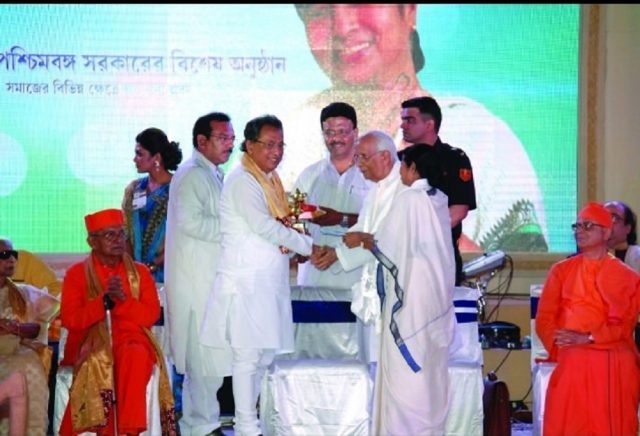
M Nurul Islam receiving the prestigious ” Banga Bhushan Award” from Mamata Banerjee , the chief minister of West Bengal and Governor Keshari Nath Tripathi
From a humble start of teaching within the confine of a small Madrasa-room Nurul Islam today runs Al Ameen Mission, a residential-style education model, expanding leaps and bounds across the states and helping thousands of disadvantaged students to move up the social ladder by ensuring fair access to quality education.
“It is all by God’s grace, and it is people’s support that gives me the motivation to go on. What I am doing is just a small thing compared to what I owe to the community,” says Nurul Islam with his characteristic modest smile that intermittently flickers on his face.
An educationist par excellence for over three decades, Nurul Islam remains soft-spoken with no air of superiority in his demeanor. However, one can easily see the quiet resolve in his eyes to do utmost for uplifting the marginalized.
“If your intentions are good, there is no stopping you,” he says emphatically, again putting on an unassuming smile.
Germination of idea
From very early on in his life, Islam had decided to work towards removing the backwardness among Muslims as he witnessed the community’s debilitating struggle and poverty from close quarters.
Nurul Islam was just in his class 10 in 1976. And at that tender age, he set up the Khalatpur Junior High Madrasa, aiming to empower the poor, backward minority community through education.
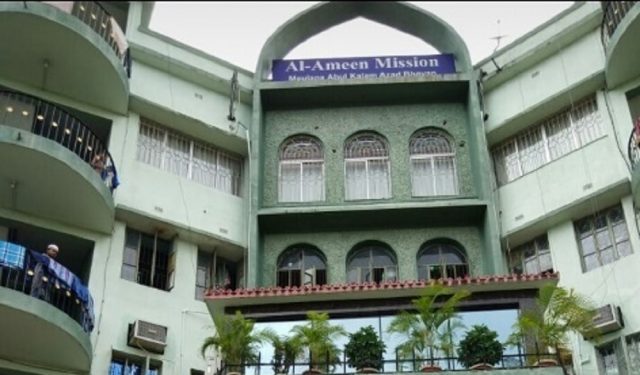
The main campus of Al-Ameen Mission located at Khalatpur village in Howrah district of West Bengal
He says, “The best way to uplift a community from backwardness is to educate them.” And since he was a teacher, he took it upon himself to teach disadvantaged students, albeit a handful at the beginning.
Initially, he had no idea how his endeavour would shape up in the future. In the 80s, while Nurul Islam was a student of Maulana Azad College, he came in contact with his private tutor, Professor A. Chakraborty. The latter would tell him about the lives of Sri Ramakrishna and Swami Vivekananda and the activities of the Ramakrishna Mission. It inspired Nurul Islam a great deal, and he began to feel the need for a similar mission for the Muslim community, and from here, the idea of the Al Ameen Mission germinated.
Besides the Junior High Madrasa, Nurul Islam had also established the Institute of Islamic Culture at Khalatpur in 1984, which was to impart modern education in accordance with Islamic values and principles. But to play a more vital and expansive role in creating awareness among Muslims regarding education, it took the shape of a mission and was renamed Al Ameen Mission at the start of 1987.
Nurul Islam often used to wonder about why, after all, Muslims can’t replicate the idea behind Ramakrishna’s mission in a Muslim setting within their community, especially when Prophet Muhammed (PBUH) has commanded them to acquire knowledge and education at any cost, going even as far as China.
Nurul Islam realised that it was the lack of self-belief and willingness on the part of Muslims that is holding them back. Islam cites Ayat 11 from Surah Ar-ra’d that says, “Indeed, Allah will not change the condition of the people until they change what is in them.”
According to Nurul Islam, this Quranic Ayat has given him the impetus to go ahead with Al Ameen Mission and work to help free Muslims from psychological barriers and financial hurdles in their path to education.
Residential system of education
Since its establishment, Al Ameen Mission has sparked a revolution in West Bengal, changing the lives of students and their families who otherwise wouldn’t have been able to afford quality education for their children.
Al Ameen Mission runs a residential system of education. Talking about the reason behind a residential system, Islam says, “To study, students need a relaxed atmosphere, which they don’t get in their homes amidst the tensions and anxiety arising out of poverty.”
Islam further says, “Teachers are the second parents, and here they are highly dedicated and well-trained. Whether teaching or mentoring, self-less teachers cater to students’ every need in the most effective way. The success of our students is due to the tireless service of these teachers who are working with us regardless of their stature and not-so-sufficient payment.”
Fees and scholarships
The Mission has lenient fee structures, determined as per the financial capacities of the students’ families. 25 percent of impoverished students are exempted from paying any fees, while 40 percent are required to pay half the fee. At the same time, 35 percent of financially sound students pay in full.
The Mission takes full responsibility for the education and upbringing of the poor but deserving students if it deems fit. Nurul Islam says, “We aim to not turn any meritorious students away from our doorsteps due to their incapacity to pay fees.”
Along with scholarships to its resident students, the Mission also provides financial help to poor meritorious students at the local level. Those from Al Ameen who get into medical colleges but are financially weak get full financial support up to nine or ten months from the Al Ameen Mission.
Rapidly growing mission
The journey of Al Ameen Mission started with only seven students, and today it houses about 18,000 students on 70 campuses (63 Bengali medium and 7 English medium) spread across the state. More than 1500 students are alone being educated in the Khalatpur headquarter that comprises four campuses. It also has four campuses outside the state: One in Ranchi and Patna, whereas two other campuses are in Tripura and Indore (MP).
While the Mission provides schooling education from class V to XII, it also has multiple residential coaching facilities for medical, engineering, and other jobs aspirants throughout West Bengal and in a few cities in Bihar, Jharkhand, Tripura and Madhya Pradesh.
“Our biggest achievement is our ability to penetrate rural areas which have lots of talents shrouded in poverty. With several branches opened in these backward areas, we are now able to bring deserving students into the fold of the Al Ameen Mission family,” Nurul Islam says with satisfaction. “But a lot remains to be done in these areas,” he adds, quickly with a changing note.
Every year is a new milestone
So far, the performance of Al Ameen Mission has been awe-inspiring, with results getting better and better every year. This year a total of 518 students of Al-Ameen have cleared NEET, all-India written test for admission to medical colleges.
Last year a total of 516 students were successful in NEET, and in 2019 this figure was 407. As many as 370 students were successful in 2018; 115 in 2017; 293 in 2016; 223 in 2015; and 212 in 2014.
The Mission has about 31,000 alumni, including 7,000 in the medical profession and about 5,000 in engineering. Many alumni are in various other fields such as civil services, academia, law, and media.
Nurul Islam shares an interesting fact. He says, “From a paltry share of 2-3% of the Muslims in medicines in the state, the representation has now increased to 25% paired with a significant rise of share in engineering as well.”
Funds and resources
When Nurul Islam set out for this noble Mission, he had no idea about the sources that might help him financially. Initially, finance came in the form of collecting a fistful of rice from every home in Khalatpur “I would then sell the rice at the local market and would use the money to run the Institution,” recalls Islam.
Since it was not enough for running the activities of the Mission, he then started approaching local businessmen for zakat (2.5 percent of the income that Muslims take out annually to distribute among the poor and needy).
As the time progressed and Al Ameen Mission became a household name for its recurring success stories, zakat donations started flowing in from across the state and the country.
While the zakat still serves as the primary donation to the Mission, people come forward to help in material as well, like donating wheat and paddies for foods and cement and bricks for construction works. Many people are also donating lands to the Mission to help it expand in different areas.
Though it is an NGO, there is no direct government funding, but it has received funds from the office of Minority Affairs for its coaching programs. In the initial years, major funds were received from Maulana Azad Education Foundation, New Delhi, and G.D Charitable Society, Murshidabad. Sri Mrinal Sen, an eminent filmmaker and the then Rajyasabha MP, also provided grants to the Mission through the MPLADS fund. The Mission doesn’t accept foreign funds.
To support its scholarship programmes, the Mission has roped in some social and charitable organisations. Contributions are also received from its alumni who are rich and well placed in their lives.
Nurul Islam says, “Mission enjoys exemption under section 80G of I.T. Act so generous citizens can come forward and donate freely although that is not enough for the magnitude of works Mission is handling.”
Plans down the road
Thanks to the help from the state government and the Muslim community at large, the Al Ameen Mission is on course to expand further. A new campus for about 200 orphan boys and girls is already underway in Khalatpur, which is to be operational next year. At present, various campuses across the state have 900 orphans, but plans are afoot to establish separate accommodations for these orphans in each campus to give them special care.
On a plot of 2 acres, allotted by the state government, in New Town, Kolkata, a new project is coming up that will accommodate about 700 aspirants of various competitive exams and research scholars. The facility will also serve as a training center for teachers and administrative staff under one roof. The project is due to be completed by 2023.
Also on the cards is a coaching center for UPSC and NEET (PG) in 1.39-acre land in Ghaziabad, a few kilometers from the national capital. It will be functional as early as 2024.
“Although we are making our presence felt in a few states, currently we have no plans to go pan-India in a full-fledged manner. Our full focus is on West Bengal right now. A lot of works are still to be done here.” Islam says as a man with utmost clarity in vision. He is not the kind of man to jump to too many projects at once to achieve personal glory. He is thoroughly dedicated to the welfare of the poor and possesses a lot of patience to achieve the outcome of his endeavours.
An example to emulate
Even if Al Ameen Mission is not going pan-India yet, it has created an example for others to emulate. Encouraged by its success, several organisations of similar models have sprung up in different parts of the state and elsewhere in India, ultimately proving to be a boon for the Muslim community.
“We Muslims have lagged so much behind in education that one man or one institution can’t bring about a sudden change. More people need to come forward to work in this direction for a tangible result,” says Nurul Islam.
“But I am glad we have inspired so many people to embark upon this noble mission now,” he adds in the end with a hopeful lilt in his voice.
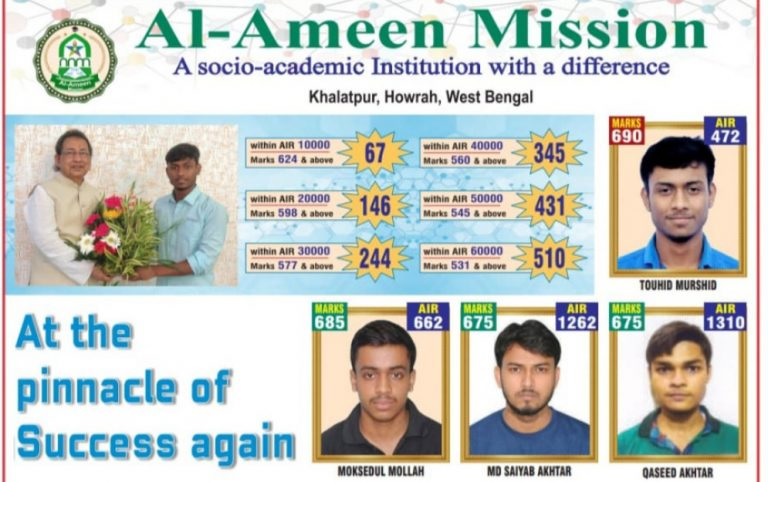
by Editor | Nov 6, 2021 | Employment, Entrepreneurship, News
Kolkata: More than 500 students coached at 70 branches of the Al-Ameen Mission in West Bengal have qualified NEET. Touhid Murshid, a student from the state’s Malda district, has emerged as the topper among them with 690 marks (AIR 472).

This year, nearly 1,800 students appeared for NEET. Among them, at least 500 to 550 students would get opportunity to study medicine, Al-Ameen Mission said in a statement.
Al-Ameen Mission is an organisation founded by Mr Nurul Islam and headquartered in Khalatpur, Howrah, West Bengal. It runs 70 coaching institutes in 20 districts of the state.
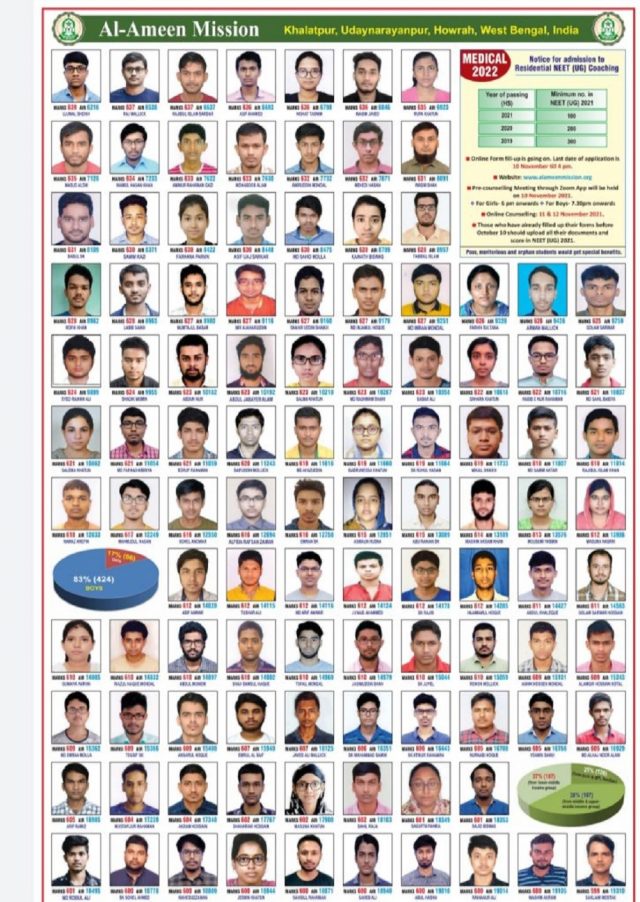
The organisation said that its 510 students come under AIR 60,000. 500-510 would get the opportunity to study medicine. The highest number of them comes from backward districts of the state. 139 candidates belong to Murshidabad and 89 belong to Malda.
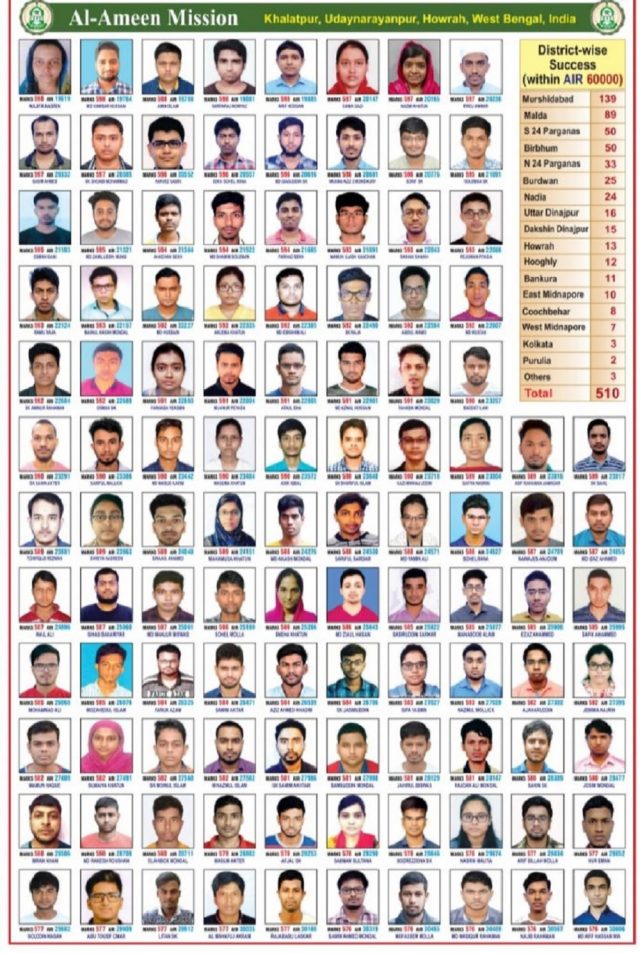
Apart from them, 50 students hail from South 24 Parganas, 50 from Birbhum, 33 from North 24 Parganas, 25 from Budwan, 24 from Nadia, 16 from Uttar Dinajpur, 15 from Dakshin Dinajpur, 13 from Howrah, 12 from Hoogly, 11 from Bankura, 10 from East Midnapore, 8 Coochbehar, 7 from West Midnapore, 3 from Kolkata, 2 from Purulia and 3 from some other districts.

The Al-Ameen Mission that was founded in 1986 has produced more than 3500 doctors (MBBS & BDS) and 3000 engineers so far, apart from scores of researchers, administrative officers, teachers and professors.
The organisation teaches 17,000 residential students and it has more than 3000 teachers as well as non-teaching staff. The main campus of Al-Ameen Mission is located at Khalatpur (Udaynarayanpur) in Howrah district of West Bengal.
At present, around 6838 students (40%) enjoy half-free studentship and 4257 (25%) enjoy full free studentship facilities from the Mission.
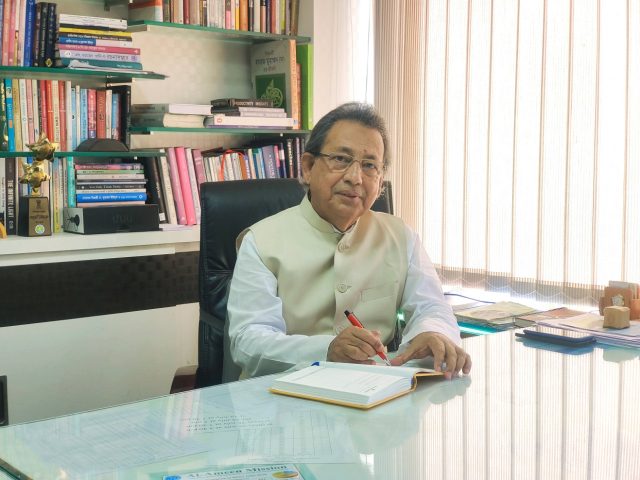
M Nurul Islam, the founder of Al-Ameen Mission
Most of the students who have qualified NEET from Al Ameen Mission belong to very poor background and weaker sections of society. We nurture their talent, develop their intellect and provide them a good environment so that they could come out with their best” Nurul Islam told Maeeshat.
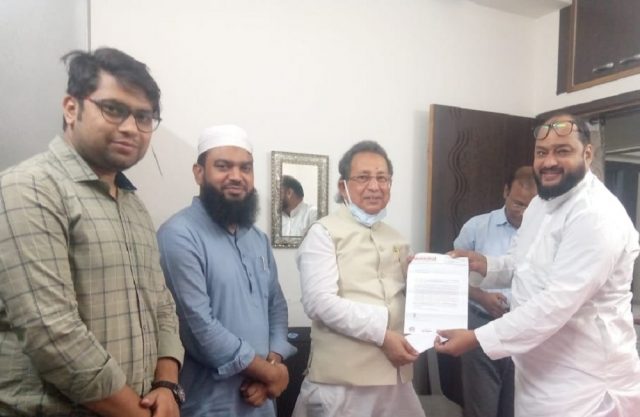
Danish Reyaz, Group Editor Maeeshat Congratulating M Nurul Islam of Al Ameen Mission
“We utilize Zakat and Sadaqah fund to achieve our goal and play our role in nation building. We urge the community members to support our efforts ” urged Islam.
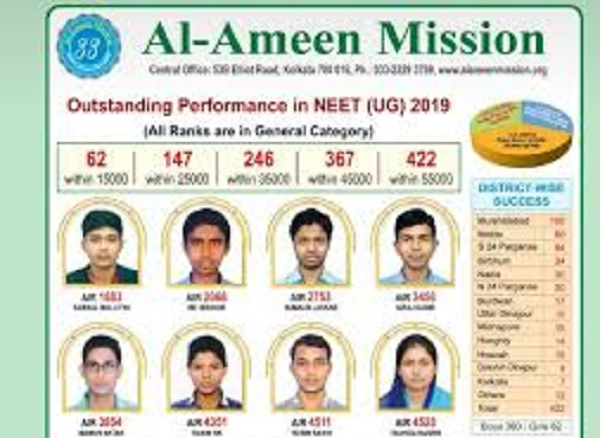
by admin | May 25, 2021 | Entrepreneurship
 Kolkata: As many as 504 students who were educated in several coaching centres run by the Al-Ameen Mission qualified the National Eligibility cum Entrance Test (Undergraduate) in 2020. This is the highest success rate witnessed in the 33 years long history of the West Bengal-based NGO.
Kolkata: As many as 504 students who were educated in several coaching centres run by the Al-Ameen Mission qualified the National Eligibility cum Entrance Test (Undergraduate) in 2020. This is the highest success rate witnessed in the 33 years long history of the West Bengal-based NGO.
The NGO said that the students who cracked the NEET belong to middle and lower income groups. It said that 150 of them are from poor and BPL families, 207 are from lower-middle income group and the 157 students belong to middle and upper-middle income group.
Jisan Hossain who scored the highest with 675/720 marks among the 504 students was facilitated by the NGO’s General Secretary M. Nurul Islam in successful students hail from West Bengal’s Murshidabad district, 66 from Malda, 54 from S 24 Parganas, 41 Birbhum, 36 from N 24 Parganas, 31 from Nadia, 28 from E & W Burdwan 20 from Howrah, 15 Dakshin Dinajpur, 14 from Hooghly, 13 from Uttar Dinajpur, 12 West Midnapore, 12 Bankura, 5 East Midnapore, 4 from Coochbehar, 3 from Kolkata and 6 belong to some other districts.
According to a Muslim Mirror report, Al-Ameen Mission has over 17000 residential students and more than 3000 teachers as well as non-teaching staff in their 56 branches across 15 districts of the state.
The NGO was started by M. Nurul Islam with just one small room in a madrassa building in 1987. Islam’s mission began when he started teaching a group of seven students in a small room of a madrasa in Howrah district of West Bengal.
Now his Al-Ameen Mission has produced more than 2400 doctors (MBBS & BDS) and 2500 engineers apart from scores of researchers, administrative officers, teachers and professors.
“I started coaching with 7 students of fifth class in 1986. In 1993 there were 11 students, four became doctors, four became engineers. Then came a feeling of satisfaction that I am doing the right thing. I never looked back,” he told Muslim Mirror.
“The motto was to give modern education with moral values in a fully residential system where students from all strata of the society, irrespective of their financial condition, would live, learn and grow together,” he added.
















